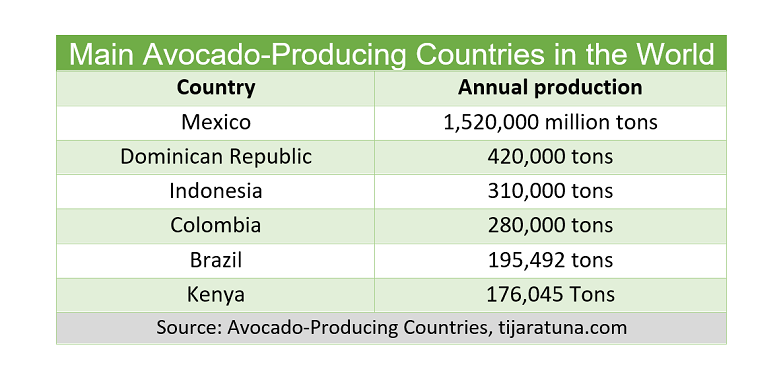By: Samah Al-Ja’rani – (Exclusive)
Historically speaking, there are no fields and lands known to cultivate avocados in Yemen, except for some successful individual experiences carried out by specialists and farmers on a limited scale during the last few decades.
Those experiences resulted in planting avocado seeds and saplings in some areas of the country, which fruited high quality avocado fruits. In this report, “Holm Akhdar” is investigating the story of cultivating the first avocado tree in Yemen, and how avocado seeds were introduced to the country.
Avocado Tree in Brief
Avocado trees were first cultivated in Mexico more than 8,000 years ago and then spread all over the world, mainly in regions with tropical or Mediterranean climate. Avocado is known by three main strains, the first of which is: the Mexican strain; which is grown in the high plateaus of Mexico; the second one is the Guatemalan strain, which suits the cold tropical climate, and finally the West Indian avocado strain, which is suitable for a humid tropical climate (see the table below).
According to sources, avocado tree, scientifically known as Persea Americana or Alzabdia, is an evergreen tree that is about 40 to 80 feet high and has many branches. It is categorized as a subspecies of the Lauraceous family. Its oval-shaped leaves are around 3 to 10 inches long. The flowers are small, greenish, and perfect (has both male and female parts).
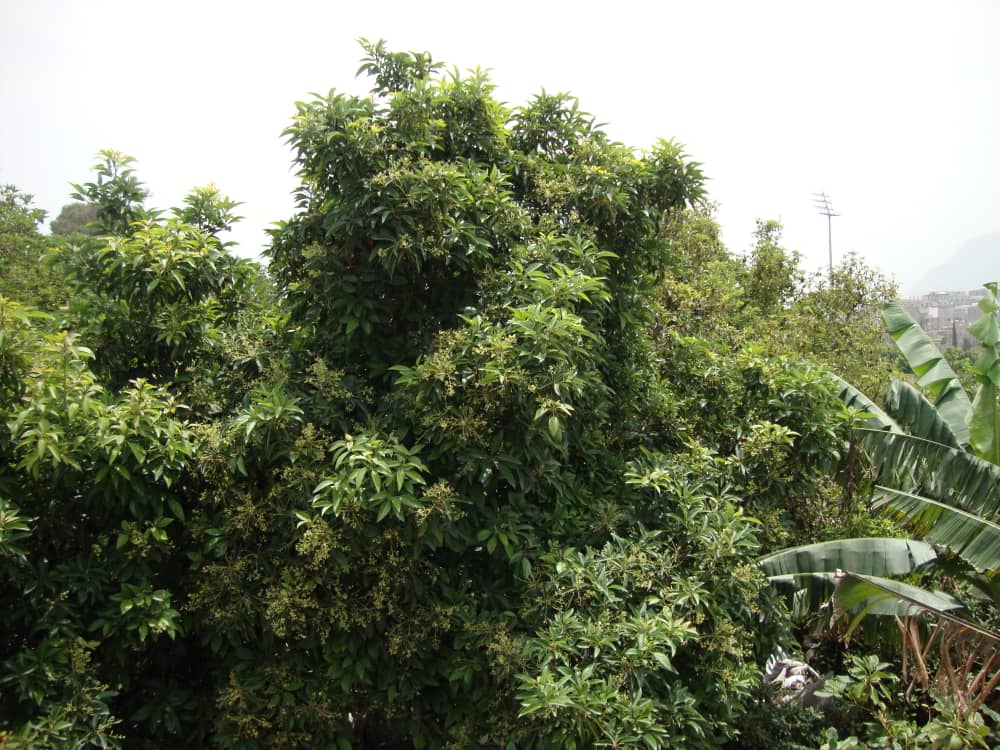
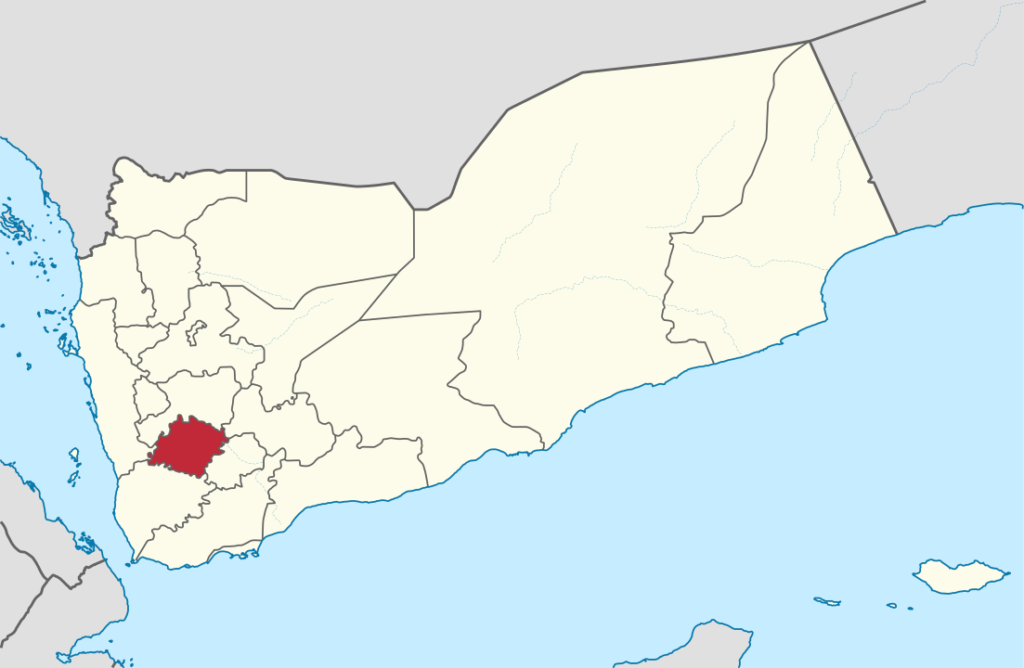
Introducing Avocado Seeds into Yemen
36 years ago, as Dr. Ahmed Abdo Saif Al-Yamani was returning from the United States of America to Yemen after he had finished his Master’s Studies at the University of New Mexico, he brought a number of avocado seeds with him, specifically from the avocados grown in Latin America.
After his return, Al-Yamani was appointed as a professor at the Agricultural Institute, which was established in 1979 in Ibb Governorate, and funded by the USAID. Al-Yamani was one of the first professors at the Agricultural Institute.
In 1989, Al-Yamani was promoted to the position of a deputy manager of the Agricultural Institute, which was turned to an Agricultural College. In return to the publication of a number of his scientific researches, Al-Yamani got his PhD in 2010 from the University of Ibb.
In the mid-1980s, Dr. Ahmed Al-Yamani, an assistant professor of Agricultural Extension at the College of Agriculture and Veterinary Medicine at Ibb University, planted 3 avocado seeds from the avocado that he brought in. He precisely planted seeds of the Lula strains (grown in northern Mexico). The story continues.
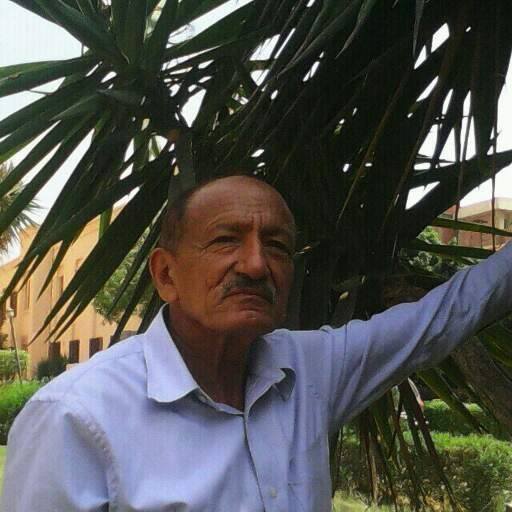
At that time, Dr. Al-Yamani had planted those seeds on the farm of the Agricultural Institute in the governorate of Ibb, which later was turned into the farm of the Faculty of Agriculture and Veterinary Medicine at Ibb University.
Al-Yamani’s idea of growing avocado seeds at the Agricultural institute then was not for the purpose of scientific research as much as it was his passion for experimentation and love of knowledge about whether avocados would grow in Ibb environment or not. However, the result was remarkably amazing.
Eman Ahmed Al-Yamani, a researcher at the College of Agriculture and Veterinary Medicine at the University of Ibb, told Holm Akhdar: “Those seeds succeeded to sprout, and avocado trees found a suitable environment to attain a remarkable, strong and rapid growth. When the avocado trees bloomed and became fruitful, the fruit was not palatable and was thrown away for it was not known in Yemen”.
After that, she added, avocado trees were subject to uprooting and damage by some people. However, the trees showed great resistance that aroused the interest of those in charge, as they reattempted to plant and grow them through propagation by cutting, but it did not work.
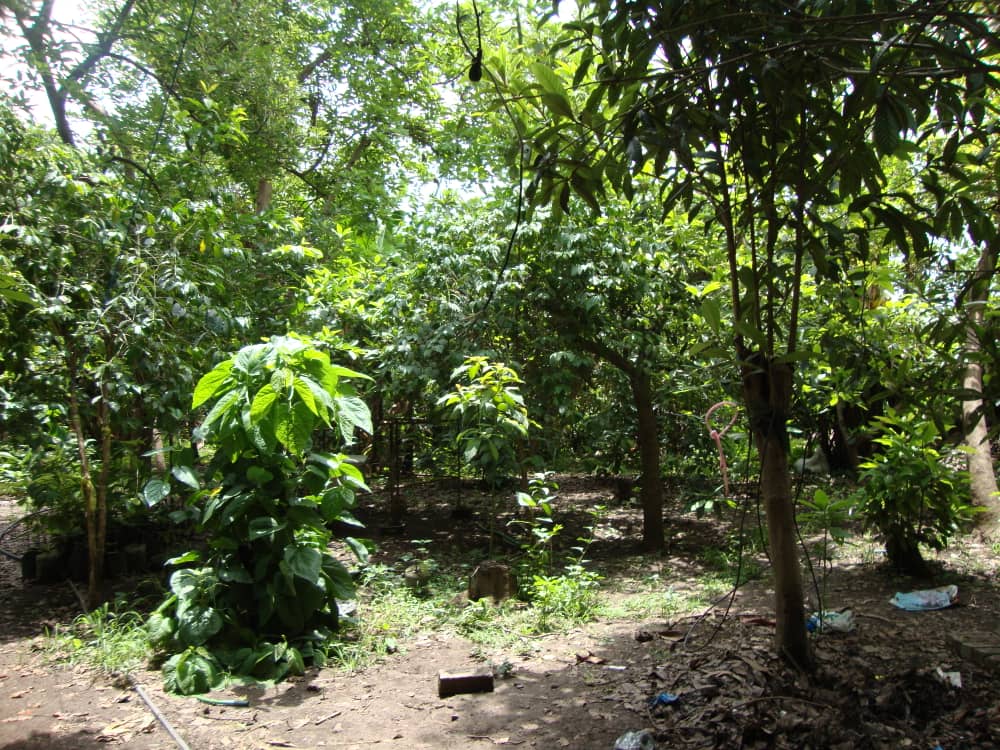
Al-Yamani Cultivates Avocados in his House Garden
The agricultural researcher, Eman, the daughter of Dr. Al-Yamani, confirmed to Holm Akhdar that her father reattempted to grow avocados again 26 years ago. He planted avocado seeds in his house garden in Ibb city. The seeds were taken from the trees he once planted on the Agriculture College farm (formerly known as the Agricultural Institute) in 1985.
In 1996, Dr. Al-Yamani planted avocado seeds in his garden, hence, the experimental and research interest on this tree began. Four years later, 3 avocado trees started fruiting, each tree yielded different fruits in size and in color. However, all the fruits shared a smell similar to the smell of star anise.
Trying to encourage avocado cultivation and instill the culture of avocado, Dr. Al-Yamani planted more avocado trees, and worked on introducing them to farmers”. Eman added.
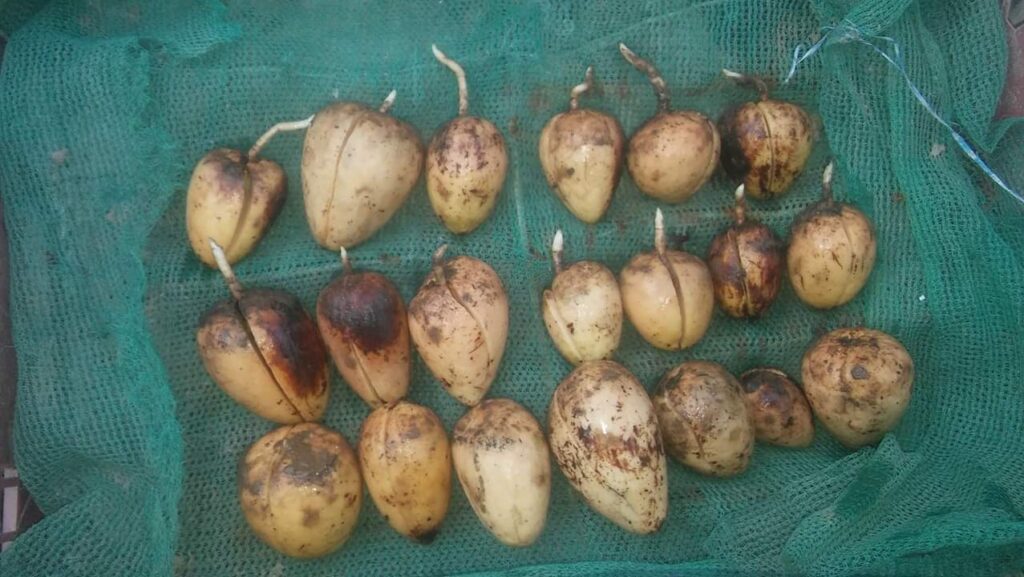
Avocado Wins the 2010 Youth Prize
On July 17, 2010, Eman Al-Yamani won the Youth Prize of the President of the Republic, awarded for Applied Sciences at the level of Ibb Governorate, for her research entitled: “Introducing Avocado Cultivation to Yemen.
This research addressed the idea of introducing avocado tree to Yemen, and Ibb governorate in particular, due to its health, aesthetic, economic and nutritional benefits.
In her research, Eman presented experiences approving the possibility of avocado cultivation in Yemen for the benefit of farmers and society in general. The research findings identified the most suitable areas and all environmental requirements needed for avocado cultivation and reaching the second generation of the Mexican Lula avocado.
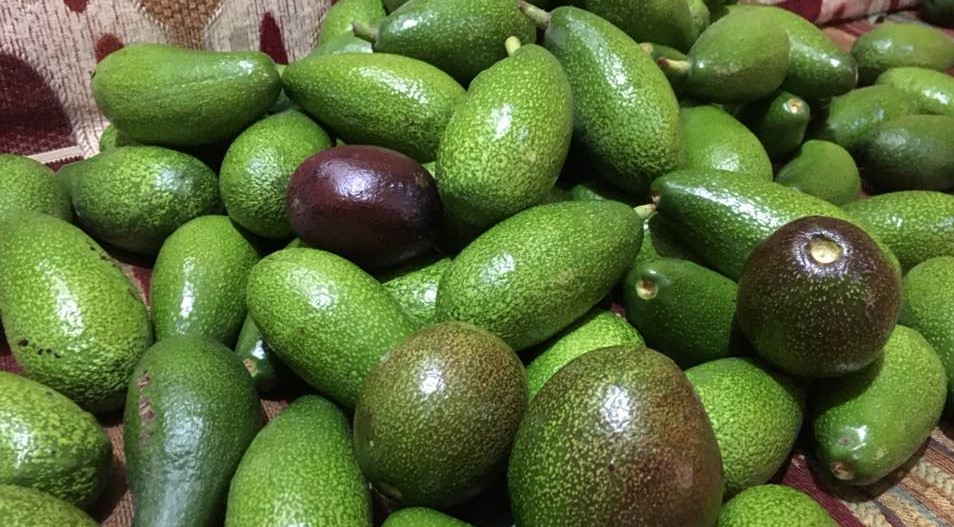
Al-Yamani Produces Honey from Avocado
According to Eman, Dr. Al-Yamani worked on producing avocado saplings at the house nursery from the ripe fruitful fruits. He planted some of them in his house garden, and distributed others to his neighbors’ gardens. He also sent several saplings to some governorates to try cultivating them, where they remarkably grew and adapted to the new environment. Avocado trees in Yemen bloomed and fruited at the age of 3 to 4 years while in other countries, such as Lebanon and Palestine, avocado trees bloom and bear fruit at the age of 5 years.
Nowadays, from 30 avocado trees of different ages on a piece of land sized about 30 meters in his house garden, Dr. Al-Yamani reaps about 50 kilograms of avocado fruits per year. Besides, he produces saplings for those who wish to plant and grow avocado either at homes or on private farms. Eman said.
On February 28, 2020, Dr. Al-Yamani stated that he had succeeded in producing honey from the avocado flower. “For the first time in Yemen, we were able to produce honey from avocado flowers”. Dr. Al-Yamani said. What makes this honey distinctive is its dark color and unique taste. However, honey production is still personal and on trial.
Avocado trees grow in deep, well-drained and sunny soils, but not in the deep and watery soils. Avocado trees do not tolerate dry soil, but rather fertile soil with good humidity is suitable for them, and they grow well on sandy clay soils where the distance between avocado trees might reach 12 x 15 meters, but in poor lands, it only reaches 4.5 x 6 meters.
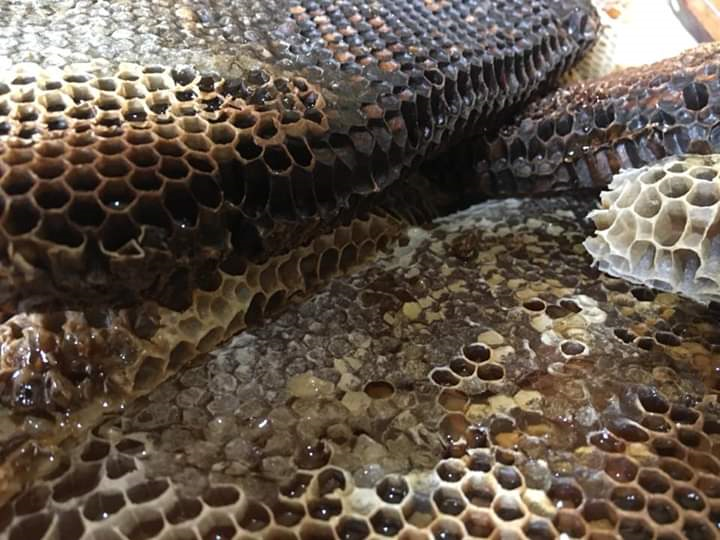
Avocado Cultivation in 4 Yemeni Governorates
According to Dr. Al-Yamani, avocado cultivation in Yemen has succeeded in some Yemeni governorates, albeit in limited numbers, prominently, in the countryside of Ibb governorate, some areas in Ottomah, parts of Dhamar governorate, Sana’a, and Saada in the north of the country; in addition to some similar areas where the temperature does not exceed 40 degrees Celsius.
However, avocado cultivation did not succeed in areas like Al-Hodaidah, Taiz, and others due to the high temperature there, and other influential climatic conditions.
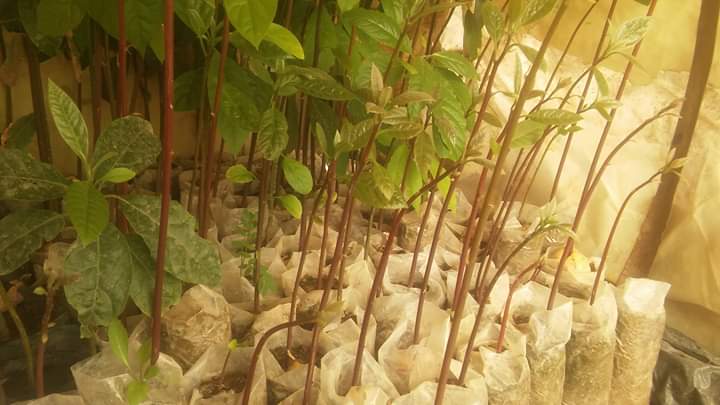
50 Avocado Trees in Sana’a
In the governorates of Sana’a and Dhamar, avocado trees were successfully planted by Dr. Ali Zaid Alqasimi, a professor at the Faculty of Agriculture at Sana’a University.
In 2017, Dr. Al-Qasimi planted about 40-50 Kenyan avocado trees in the garden of the Dentistry College at Sana’a University.
Dr. Al-Qasimi found out that the trees grew well, and in the last few months of 2020, avocado trees started to bloom, and this indicates that Sanaa’s environment, climate and agricultural soil are very good and suitable for avocado cultivation and production.
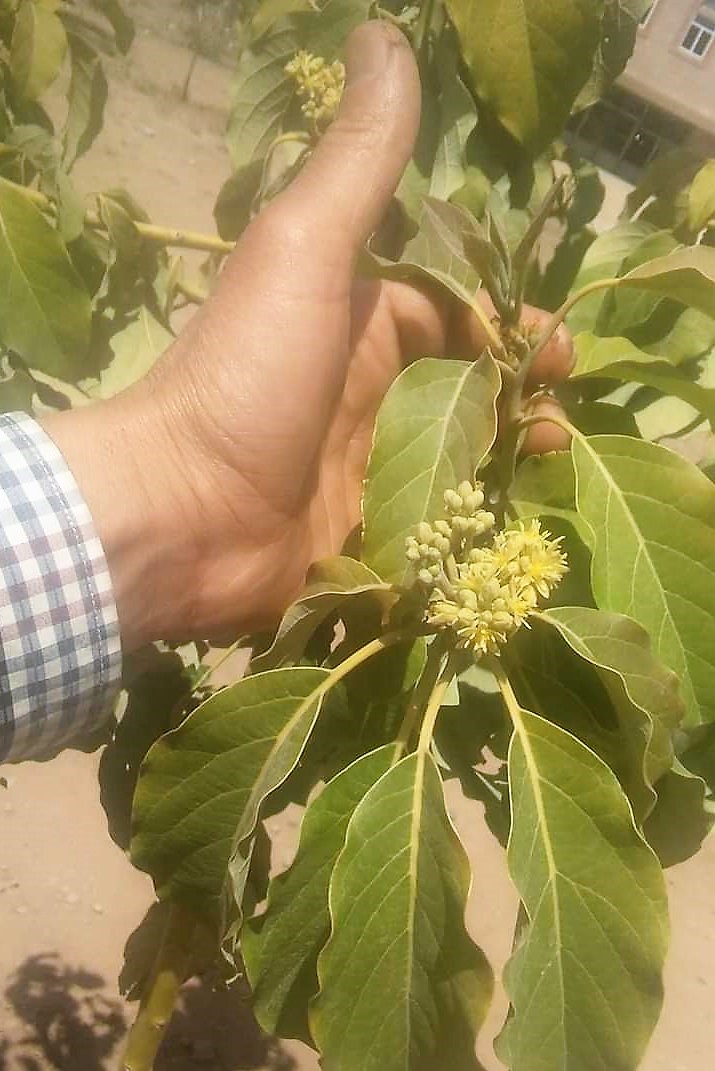
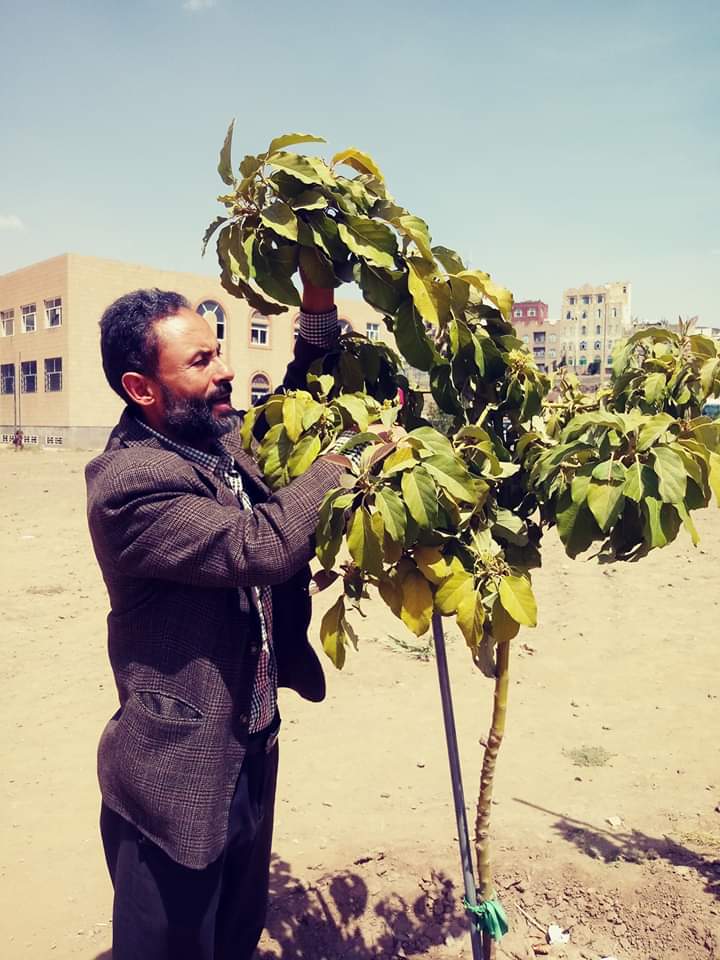
Avocado in the Yemeni Market
Nearly along the last ten years, the local demand for avocados has increased, especially from the cafes, juice shops and cafeterias in major Yemeni cities. As a result, locally grown avocados have started appearing limitedly in some cafeterias and coffee shops.
In a field visit, local avocado varieties found were limitedly displayed for sale in some malls and supermarkets in Sana’a and Ibb cities, and avocado juice can be purchased from some juice shops and cafeterias.
Some cafeteria and buffet owners in the governorates of Ibb and Sana’a told (Holm Akhdar) that the price of local avocado ranges between 1,500- 2,000 YR per kilogram while imported avocados cost up to 3,000 YR per kilogram.
Owners of coffee shops and buffets confirm that the local avocado is tastier, cheaper and has better quality than the imported avocado.
They also emphasize that most of the imported avocados come from Kenya, including (Hans) and (Nama Group Limited) varieties, which are of medium size, where a carton of avocados weighs 4 kilos, and the price amounts to 3000 YR per kilo.
The reason for the good quality and taste of locally grown avocado probably lies in the agricultural aspect, where the environment and climate of Yemen had a pivotal role in improving the quality of the avocado in terms of steady growth and rapid production. Thus, it is distinct from the imported avocado (especially the Kenyan avocado) with its good taste and smell.
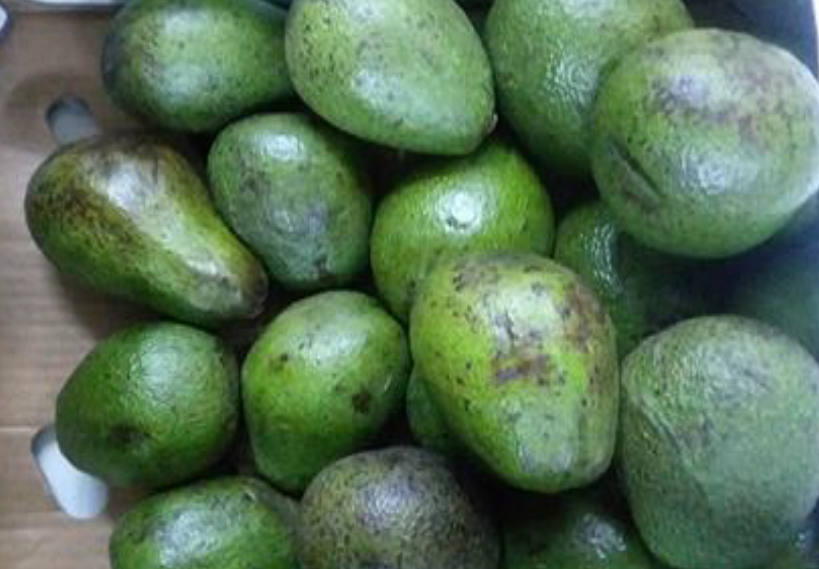
A proposal for Avocado Cultivation in Yemen
Given the fact that avocado tree grows rapidly and faces few diseases, and based on what mentioned above, we find out that the experience of avocado cultivation in Yemen – despite its modesty – has greatly succeeded in Ibb governorate, in terms of growth, production and quality, and in some other rural areas in Yemen. Therefore, concerned government authorities should prepare a future vision about benefits of avocado cultivation in Yemen and its economic feasibility in the local market.
Accordingly, it is strongly recommended that farmers be urged to move towards avocado cultivation due to its high nutritional value and a handsome financial return, as it is globally called the green gold or the neglected treasure for its high price in most countries of the world, the great nutritional value of nutrients and unsaturated fats.
Recommendations:
To develop and expand avocado cultivation in Yemen, the Ministry of Agriculture and all the agricultural research colleges and centers are recommended to:
- Raise awareness about the avocado fruit through the department of Agricultural Extension in the Ministry of Agriculture.
- Prepare a plan towards conducting agricultural researches and experiments on farms of Agriculture Faculties to develop and examine avocado varieties suitable for all Yemeni regions and governorates.
- Schedule field visits to introduce avocado tree to farmers in areas where avocado cultivation has been successful.
- Provide farmers with free of charge avocado saplings from the Ministry of Agriculture and the Agricultural Research Authority, plus the plant’s fertilizers and care needs.
- Due to the increase in Yemen’s import of avocados in recent years, and given the economic feasibility of avocado cultivation, avocados, after being supported and cultivated, should be counted among the fruits that are banned from being imported from abroad, in order to reach self-sufficiency.
How to make avocado a moneymaking crop in Yemen:
- Introducing avocado to Yemeni farmers and consumers and highlighting the importance of growing avocado in Yemen.
- Marketing avocado locally in a way that makes it good and palatable to the consumer.
- Enhancing the culture of avocado and making it an important crop that raise level of nutrition in the daily meals of the Yemeni consumer.
- Promoting for avocado through introducing new ways to use the avocado fruit with the main meals.
- Given the fact that avocado being globally and immensely used in the medical and cosmetic field, we have to raise consumers’ awareness of the importance of this fruit and its benefits and returns on the farmers, medicine and cosmetics traders.
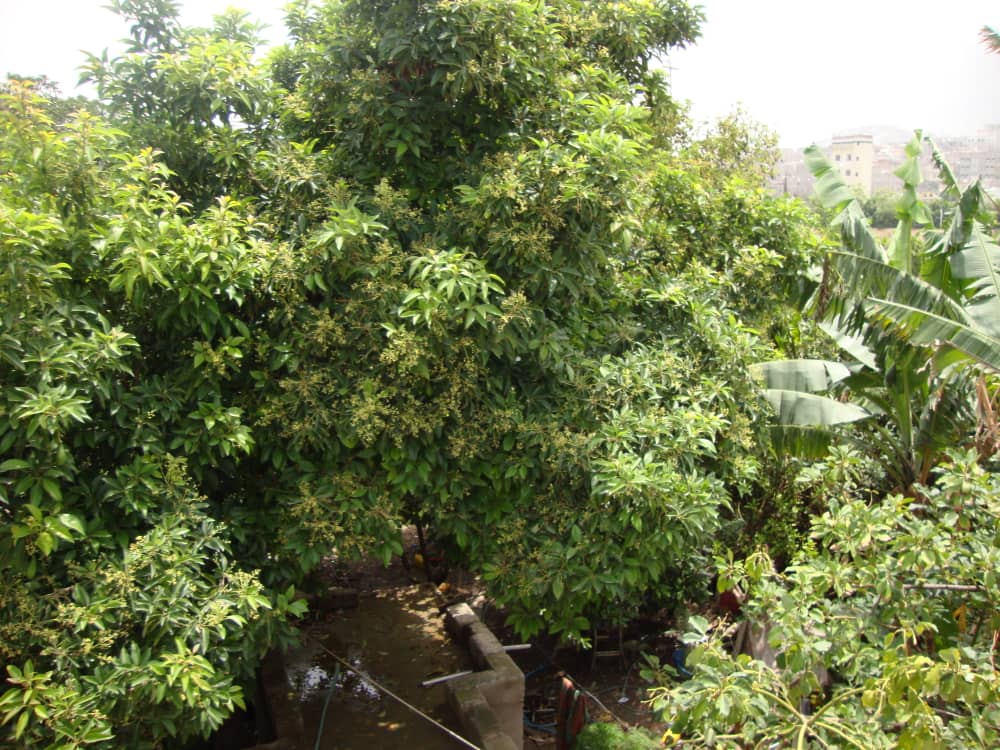
What does avocado cultivation need?
Avocado cultivation needs an environment free from cold or frost; slight wind does not matter, however, strong and stormy winds prevent moisture, and affect pollination, because it dries up the flowers.
Avocados can also be grown on a wide range of soils, but it requires good drainage because it cannot live with waterlogging. Poor drainage and soil acidity below 6.2 are favorable conditions for the development of root rot.
Avocado tree, being categorized among fruit trees, needs 4 to 5 years to bear fruits, which do not ripen until they fall or are picked from the tree.
As avocado exporters pick its fruits, they keep them in refrigeration equipment until they properly ripen.
An avocado fruit contains one large seed, which makes up 10-25% of its weight. Fruits of different avocado varieties may vary in moisture and quantity of oil ranging from less than 5% to more than 30% of oil, and an avocado fruit weighs about 0.25 pounds to over 3 pounds.
References:
- Ahmed Abdo Saif Al-Yamani, Assistant Professor of Agricultural Extension at Faculty of Agriculture, University of Ibb.
- Eman Ahmed Al-Yamani, Master in Agriculture, Researcher and Demonstrator at the Faculty of Agriculture and Veterinary Medicine, University of Ibb.
- Ali Zaid Al-Qasimi, Professor of Fruit, Department of Horticulture and Forestry at the Faculty of Agriculture – University of Sana’a.
- Roni Najar, Charle Abdullah, and Samir Medawar, “Avocado Cultivation: A Feasibility Study in Lebanon”, funded by the European Union, Lebanese Foundation for Economic and Social Development, Lebanon, June 2001.
